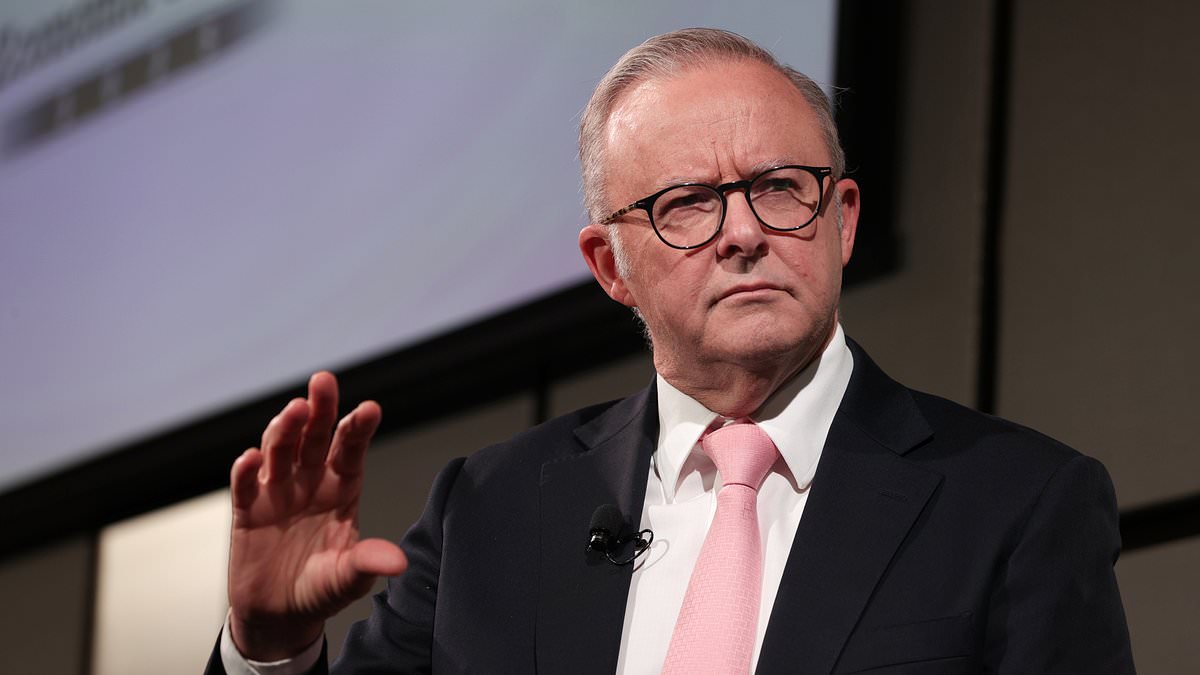Anthony Albanese has talked up ‘s independence from the US while paying tribute to wartime Labor leader John Curtin, in a speech that will be sure to raise eyebrows in the White House.
Speaking in Sydney on Saturday night to mark 80 years since Curtin’s death, the Prime Minister said Labor would pursue ‘s interests, even where they differ from those of the US.
The PM drew on Curtin’s resistance to British and American pressure to deploy troops to Burma, now Myanmar, following the fall of Singapore during World War II.
Curtin, at the time, said the region’s security could not be ‘outsourced to London’, demanding foreign strategy be ‘anchored in strategic reality, not bound by tradition’.
‘Curtin’s famous statement that “looked to America” was much more than the idea of trading one strategic guarantor for another. It was a recognition that ‘s fate would be decided in our region,’ Albanese said on Saturday night.
‘Yet our alliance with the US ought to be remembered as a product of Curtin’s leadership in defence and foreign policy, not the extent of it,’ he said.
‘Then, and now, we championed the rights and the role of middle powers and smaller nations. Then, and now, we recognised that our region’s security depends on collective responsibility.
‘Then, and now, we strive for a world where the sovereignty of every nation is respected and the dignity of every individual is upheld. Then, and now, backs our words with deeds.’
Albanese said the government was rebuilding ‘s position as a leader in the Pacific region and working to stabilise its relationship with China.
Albanese is due to visit China this month for his fourth meeting with President Xi Jinping and used the Curtin anniversary to reaffirm ‘s broader foreign policy direction.
The ‘n way’, Albanese said, required support for strong multilateralism and adherence to a rules-based order.
It also included support for smaller and mid-sized regional powers and the rejection of ‘great power peace’ as the basis of Pacific stability.
He said was currently involved in rejuvenating the region’s leadership, stabilising ties with China, and deepening the nation’s economic engagement in the Asia-Pacific.
Albanese took the chance to promote initiatives strengthening co-operation with local powers including Indonesia, India and Papua New Guinea.
‘While the nature of global uncertainty evolves, this fundamental truth remains: cannot predict, or control the challenges we will face,’ he said.
‘But we can determine how we respond. We can choose the way we engage with our region and deal with the world.
‘The stability and prosperity we build and defend with our partners, the peace and security we seek for ourselves. Above all, we can choose the nation we strive to build here at home.’
Albanese said ‘s alliance with the US was regarded as ‘a pillar of our foreign policy’ and the nation’s ‘most important defence and security partnership’.
The comments come as Albanese faces growing calls to strengthen ties with Trump’s administration, which is pressuring allies to boost defence spending to 3.5 per cent of GDP.
Albanese has spoken with the US President three times by phone, but is yet to meet him in person after talks scheduled at last month’s G7 summit were cancelled amid tensions in the Middle East.
Critics have taken the speech to imply a divide between Canberra and Washington’s strategy and interests.
Hudson Institute senior fellow Dr John Lee told The n that Albanese’s speech would be more credible if it was matched with more investment in national defence.
‘Calling for a more independent foreign policy would be understandable and credible if we are prepared to spend more to meet our defence needs rather than rely as much on American capacity, technology and presence as we currently do,’ he said.
‘It does not appear that the Albanese government is prepared to do that.
‘Therefore, if Albanese is really serious about a strategic divergence away from the US, this will leave more isolated and vulnerable.’
He said the comments were unlikely to influence the outcome of the US’s 30-day AUKUS review but could shape how Washington responds to its findings.
The White House response, he said, would be swayed by their own assessments of n intent and readiness to carry its own weight.
He said has become an outlier internationally, with NATO countries – bar Spain – and Asian allies all increasing spending on defence.
